We’re in teeth grinding times
If you notice you’re grinding your teeth a lot more lately in your sleep—you’re not alone. During normal times, nearly one in 12 adults grind their teeth at night, according to a study published in Critical Reviews in Oral Biology and Medicine. But when you ratchet up stress and anxiety—two major causes of teeth grinding—the numbers are likely to increase, reports the American Dental Association. That means everyone’s risk goes up during a coronavirus pandemic, quarantine, and fears of catching a potentially life-threatening disease like Covid-19. Teeth grinding, known as bruxism, can also be triggered by sleep disorders, an abnormal bite, or missing or crooked teeth.
For most people, teeth grinding won’t do much damage, but for others, it can lead to fractured teeth or jaw pain. To keep your teeth grinding at bay, no matter the cause, we spoke with experts who offer some surprising home remedies.

Bite guard
You might feel awkward at first when you hit the hay looking like a hockey player. But, a bite splint to wear overnight can reduce grinding and prevent damage to teeth. When done at the dentist’s office, your dentist (or their staff) takes impressions of your teeth and a bite guard is made to fit perfectly. You can also opt for a do-it-yourself one if you’re looking to save money. To make your own, purchase a high-quality dental sports guard, shares Peter Drews, DDS, Drew Dental Services, in Lewiston, Maine. “Once the device is molded to your mouth, trim the guard short so it covers your canine teeth on each side. This way, the back teeth do not touch when their teeth are together.” As a result, the anterior teeth get overloaded and the natural reflex of muscle relaxation occurs.” Find out the 11 things your dentist wish you knew.
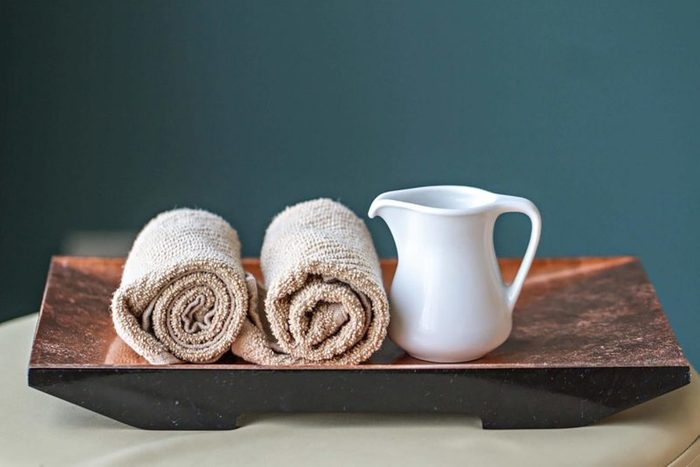
Hot towel/compress
If you find yourself instinctively clenching your jaws, warming up may just be the answer. This method is best done using a heating pad. While lying down, rest one side of your face on a heating pad for 15 minutes, then repeat on the other side. The heat increases the local blood supply, improves circulation, and helps relax the muscles. According to Mazen Natour, DMD, New York City-based prosthodontist, “Heat helps relax the muscles and may alleviate tension, reducing the potentially destructive grinding.”
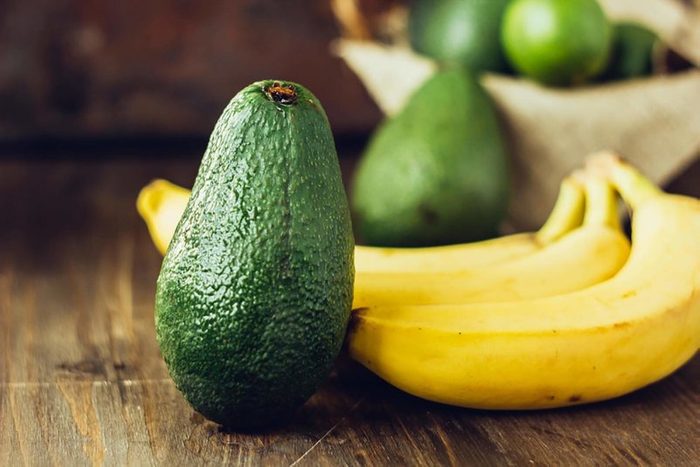
Magnesium
Tweaking your diet can also help you quit grinding. Magnesium is known to benefit muscle and heart health. This helpful alkaline is also integral to the relaxation of muscle tissue and blood vessels. According to Allison Williams, a licensed naturopathic physician at Southwest College of Naturopathic Medicine & Health Services, in Tempe, Arizona. “Oftentimes teeth grinding is due to tight or spasming jaw muscles. The relaxing effects of magnesium either applied topically (there are magnesium sprays or lotions available), eating magnesium-rich foods, or taking magnesium supplements can prove beneficial.” Here are the six things you should know before taking a magnesium supplement.

Stress management
Stress is a primary contributor to teeth grinding, so start toning down those elevated stress levels ASAP. You may notice tightening muscles in the neck, jaws, or upper back; according to Dr. Williams, these all tighten up when we are stressed and can make sleeping less restful. “Stress management practices, in conjunction with other therapies to improve tissue relaxation and reduce muscle spasm, can be great ways to reduce teeth grinding,” she notes. “Journaling, meditation, relaxing baths, yoga, and a quality exercise routine are just a few ideas to consider better stress management practices.”
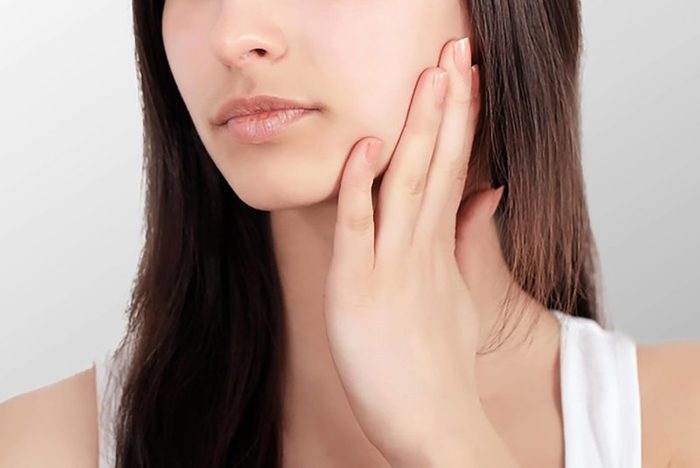
Jaw muscle massage
Your body has quite a few muscles that work to clench and open the jaw—the masseter, temporalis, medial pterygoid, and lateral pterygoid to be exact. When these are overly tight, they can aggravate the mouth and increase teeth grinding. Massage them daily in order to help loosen up the musculature. Dr. Williams advises starting with a jaw stretch: “Fully open and close your jaw for about 10 repetitions, then open your mouth and move your jaw side to side for an additional 10 repetitions. Afterward, take your hands along the side of your jaw starting at the uppermost area from your ears. Use the pads of your fingers and rub in a circular motion where you find tight knots or strictures press, and hold that area for a couple of seconds. Move to the lower part of your jawline and do the same, always pressing and holding areas with tight knots or trigger points.” (Learn the 17 tricks for a soothing self-massage.)
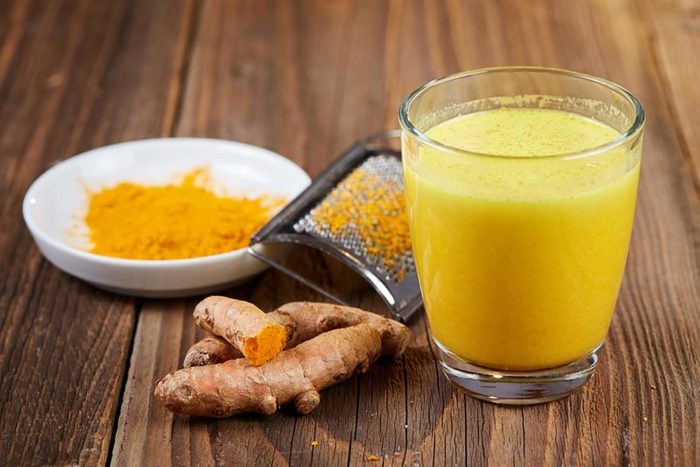
Turmeric milk
You may have heard that drinking a glass of milk before bedtime is good for health. Mixing turmeric with milk is even better. This holy grail of mixtures can help control teeth grinding with its dual-purpose. The amino acid tryptophan in milk helps your nervous system relax and sleep soundly. Meanwhile, turmeric acts as a pain reliever to reduce jaw pain and headaches. According to Dr. Drews, “Improper sleep has shown to increase symptoms of [temporomandibular disorders] TMD. When we do not cycle through our complete sleep cycle, it has shown that we process pain differently. Things like caffeine, stress, alcohol, and late-night electronic devices affect our ability to have our REM sleep cycle, but natural supplements can help us get back o cycle.” That’s not all turmeric can do. Did you know it also benefits your skin and hair?
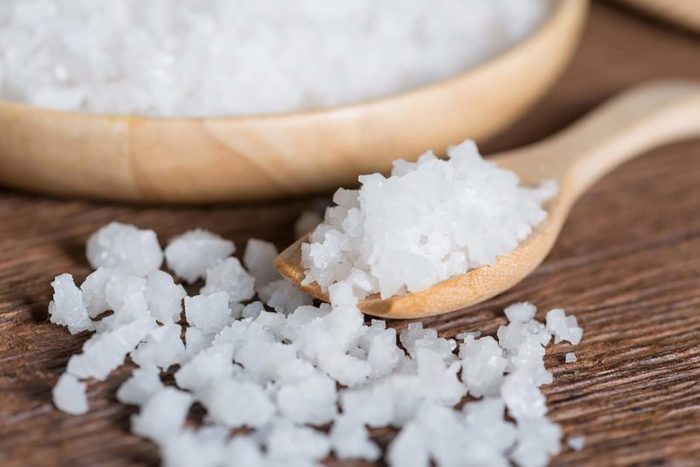
Epsom salt baths
Epsom salts may be called salt and look like salt. But, their inherent benefits make them very much distinct from plain old table salt. It contains detoxing elements that flush these toxins and heavy metals from the body. This compound of magnesium and sulfate is also popular for softening and exfoliating skin, drawing out impurities, and even relieving cold or flu symptoms. This will help increase your magnesium intake (which also assists with teeth grinding). Also, its absorption through the skin will bind with serotonin in the brain, helping you to relax and alleviate stress. “Epsom salt baths are another great option to soothe muscles and reduce tension. Relieving any aches and cramps will cause you to rest better over the course of the night. As an added benefit, you will wake up feeling more refreshed and energized,” informs Rajan Sharma, DDS, board-eligible enthodontist at University Dental Associates, in Chicago.
